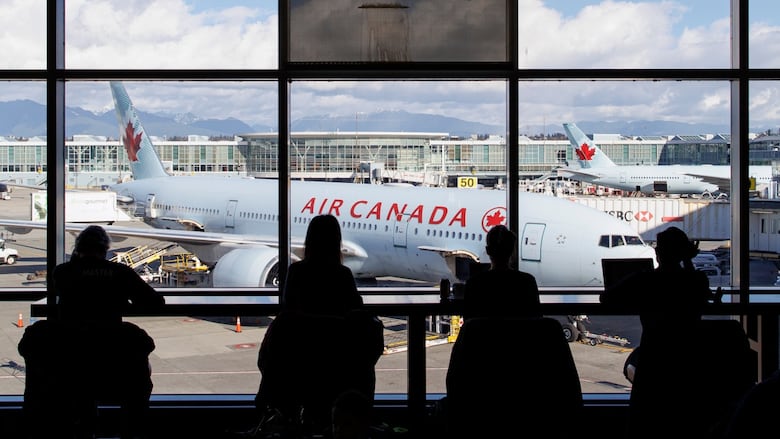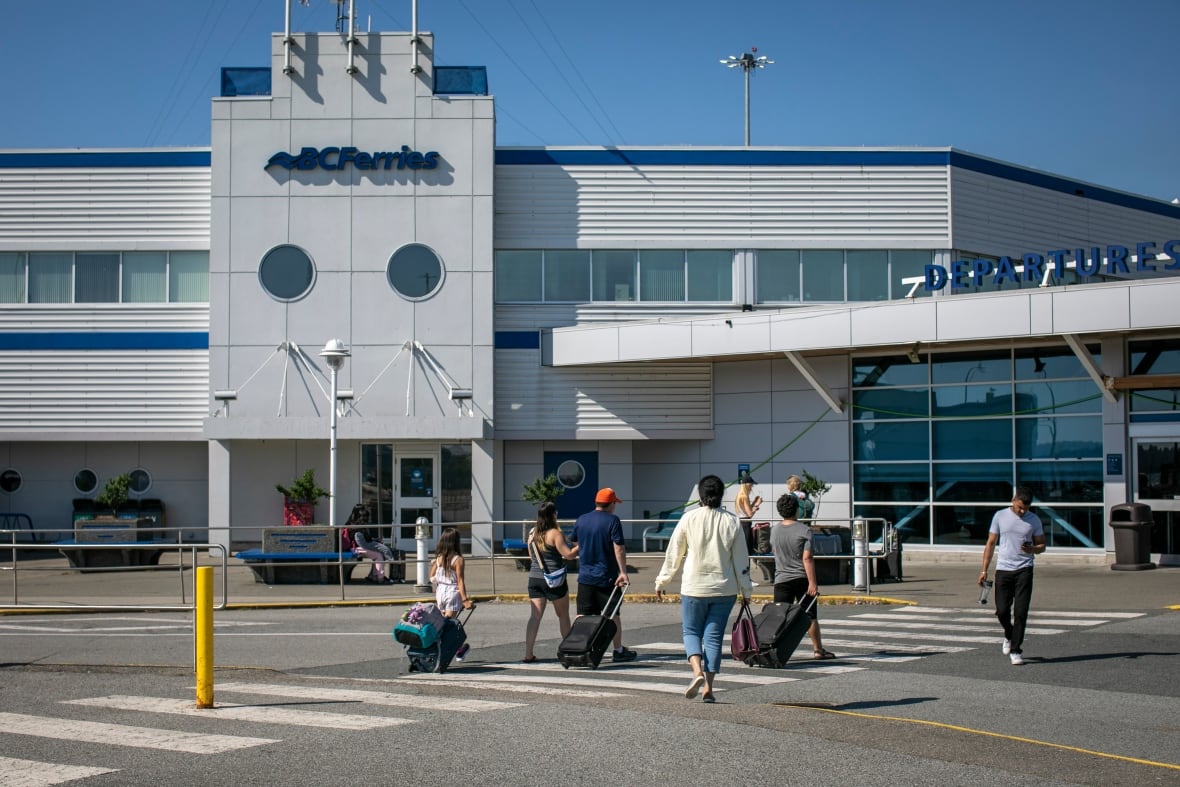What travellers can expect during the B.C. Day long weekend
B.C. Ferries and YVR brace for heavy traffic as RCMP urges caution on busy roads

As British Columbians gear up to celebrate B.C. Day, officials are urging the public to plan ahead and stay safe amid expected travel congestion on ferries, highways and at airports.
B.C. Ferries says the long weekend is its busiest of the year, and it's anticipating a five per cent increase in vehicles and a 10 per cent increase in passengers on routes between the Lower Mainland and Vancouver Island compared to an average summer weekend.
Traffic is expected to match last year's levels, and the corporation says all 37 vessels in its fleet are deployed and operating at full capacity, including the 61-year-old Queen of New Westminster.
"In just the past month, that one vessel has experienced 10 mechanical and electrical issues: engine leaks, power interruptions, faulty alarms," said the company in a statement to CBC News. While none of the issues caused delays or cancellations, all required immediate attention.

The ferry operator says its aging fleet wasn't built for current demand and is calling for fleet upgrades, adding that travel demand is projected to rise by 15 per cent over the next few years — "outpacing our capacity even with four new vessels."
Ferries have faced significant challenges in recent years, from staffing shortages to last-minute cancellations and sailing waits. Last year, the propeller fell off the Queen of New Westminster, leading to 200 days of travel disruptions and costing the corporation roughly $15 million.
On Friday, there were sailing delays across several routes due to heavy traffic, with crews taking extra time to load additional vehicles. More delays are expected throughout the day.
All vehicle reservations on major routes are currently full, and travellers without bookings are being urged to consider off-peak times, alternate routes, or walk-on travel options.
Busy summer traffic at Vancouver airport
Vancouver International Airport says August is expected to be the busiest month of the summer, with more than 2.7 million passengers travelling through the airport, which accounts for 40 per cent of its total summer travels between mid-June and early September.
The airport expects to welcome approximately 359,586 travellers, a 7.4 per cent increase from last year, during this long weekend alone from Aug 1 to Aug. 4.
Friday is expected to be the busiest day, with nearly 92,000 passengers passing through the airport.
It's the looong weekend! With an average of 90,000 passengers expected through B.C. Day, don't forget to:<br><br>✅ Arrive early (2 hours for Domestic, 3 hours for International)<br>✅ Enroll in Digital ID<br>✅ Pre-book your JetSet YVR Parking<br><br>Get ready: <a href="https://t.co/kCL4Tmlzj5">https://t.co/kCL4Tmlzj5</a> <a href="https://t.co/vXyozNQRfs">pic.twitter.com/vXyozNQRfs</a>
—@yvrairportThe most popular destinations from YVR this weekend include Toronto, Calgary, Edmonton and Montreal, with San Francisco taking the fifth spot as the top U.S. spot.
As travellers pack into YVR, staffing shortages at Nav Canada, the country's air navigation service provider, caused delays to dozens of flights on Thursday. While the situation was resolved later that evening, flight disruptions tied to air traffic control have been reported across Canada in recent months.
The airport was slammed with over 200 flight delays on the Canada Day long weekend as well, largely due to a critical shortage of air traffic controllers.
Border delays persist amid drop in southbound travel
Border wait times for southbound travel at the Peace Arch and Pacific Highway crossings exceeded one hour on Friday afternoon.
But overall, southbound traffic from B.C. into Washington state has dropped significantly in recent months. Data from the Whatcom Council of Governments shows southbound travel from B.C. into Washington state was down 43 per cent in June compared to the same time last year.
Traffic has declined each month since February, when U.S. President Donald Trump began seriously talking about tariffing Canadian goods. Now, he has signed an executive order increasing the tariff rate, which had been set at 25 per cent since March, to 35 per cent as of Friday.
Last month, nearly 89,000 fewer crossings were recorded across the Lower Mainland's five major entry points compared to the previous June.
Reginald Raju, store manager at the Peace Arch Duty Free Shop, says the decline has affected business dramatically, though he's recently noticed a slight uptick in Canadian travellers travelling south.
"We are still down about 30 per cent compared to previous years," he told CBC News. "We are still 70 per cent American traffic, but we have seen an increase in Canadians coming back."
Raju says the uptick may be linked to school holidays and cruise ship season. He also attributes longer border waits to reduced staffing on the U.S. side.
"There are fewer border patrol guards ... and fewer lanes open," he said.
CBC News has reached out to the U.S. Customs and Border Protection to confirm the staffing situation.
ICBC and police urge caution on the roads
With so many people expected to travel by car, ICBC is warning drivers to take precautions against fatigue, particularly during long, hot drives.
"Seventy-one per cent more people are injured or killed in fatigue-related crashes in July and August in B.C. compared to the rest of the year," the corporation said in a statement this week.
"Consider how you feel before getting behind the wheel," said Kathleen Nadalin, ICBC's road safety manager. "If you're feeling rested, keep in mind that hot summer weather can be draining, especially on long drives."

On average, the B.C. Day long weekend sees two people killed and over 560 injured in more than 2,000 crashes provincewide, including nearly 400 injuries in the Lower Mainland alone.
B.C. RCMP and B.C. Highway Patrol say officers will be conducting roadside checks throughout the weekend.
In a social media post, Cpl. Michael McLaughlin says officers are focused on curbing speed-related crashes after "a high number of fatalities in recent weeks."
"Our officers would much rather give you a ticket, tow and impound rather than have to tell your family that you're not coming home," he said.
With files from Sohrab Sandhu


